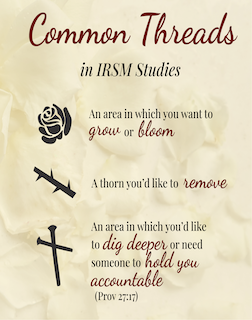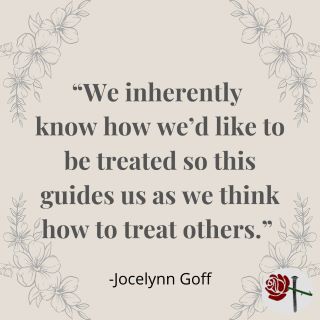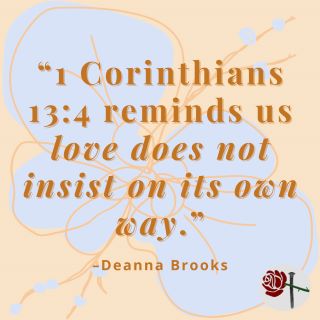-
Common Threads
Written by Michelle J. Goff, Founder and Director of Iron Rose Sister Ministries
There is nothing more frustrating than trying to slice a tomato with a dull blade. Therefore, we sharpen it. When iron sharpens iron, sparks fly. It is a natural byproduct of the necessary sharpening process.
While living in Venezuela, there was a certain whistle-like tune the sharpener used as he walked the streets, advertising his services. Spiritually speaking, there is no special whistle to recognize those who are gifted in this area, but thankfully, God does not expect us to know how to sharpen ourselves on our own. He has provided others to help us.
Sharpening, like growing, is an ongoing process. It is not a one-and-done. It is like sanctification or transformation that God continually facilitates through His Son until we meet Him in heaven.
In God’s roles as Teacher and Lord, He walks with us and guides us, comforting and correcting, training us in righteousness. He provides us with the example of His Son in whose steps we can follow (1 Pet. 2:21) and the support of His church that serves alongside us.
As we continue to walk in the light as He is the Light (1 John 1:5), we recognize areas in which we need to be transformed more and more into the image of Christ (2 Cor. 3:18). Those areas may be obvious to us or may be more elusive to identify. They often appear as a dulled spiritual blade as we enter a spiritual battle. You are not fighting this struggle alone. We can strengthen one another as iron sharpening iron.
Since Iron Rose Sister Ministries was established, the Common Threads have served as the three elements of the logo in personal and practical application. They can be found as a part of each chapter of the interactive Bible study books. They are designed to be shared and prayed over in a small group context—from three to eight women.
The images below are the updated version of the Common Threads from our new three-language logo.

The Common Threads are unique to each woman and her current place in life. Yet they are often intertwined. For example, when we want to grow or bloom in an area, we must first remove the thorn—whatever hinders and the sin that so easily entangles (Heb. 12:1). Of course, if the thorn is a sin, it must go! However, at times, we have thorns like the one that Paul begged the Lord to take from him. Yet God replied, “My grace is sufficient for you, for my power is made perfect in weakness” (2 Cor. 12:9 NIV).
Our area of emphasis for growth or the thorn of hindrance may be the same area in which we want to dig deeper (in Bible study or in understanding) or need someone to hold us accountable. You will notice that the image of iron sharpening iron is two nails in the form of a cross. A part of our humble service to one another is to lovingly sharpen one another and deepen together our relationships with God and each other, all while cheering one another on as we are transformed into the image of Christ.
Whether inspired by a Bible verse from this post, a recent sermon, or something else God has been revealing to you, invite at least one Christian sister, an Iron Rose Sister, to share in the Common Threads with you. You will both be richly blessed in your fulfillment of the Proverb 27:17.
“As iron sharpens iron, so one person sharpens another.”
Personally, I ask you to join me in prayer that I will bloom in my acceptance of God’s grace in my weakness. It is an easy trap for me to want to do it all on my own. That pride or personal strength can be a thorn that God has called me to set aside so that He is glorified in all He does. I have Iron Rose Sisters who sharpen me by reminding me of my physical limitations, while acknowledging my desire to serve in more ways than I am able. I am digging deeper into my understanding of God’s abundant provision and His delight in using all of us to accomplish His will and grow His Kingdom.
What are your Common Threads this week?
-
Dealing with My Sticky Parts
 I can be my own worst critic and my own worst enemy. I know most of my flaws intimately and often recognize them just after they have raised their ugly heads. Then, I beat myself up for having hurt others through my own failings.
I can be my own worst critic and my own worst enemy. I know most of my flaws intimately and often recognize them just after they have raised their ugly heads. Then, I beat myself up for having hurt others through my own failings.“All have sinned and fallen short of the glory of God” (Rom. 3:23). Keenly aware of my shortcomings, the “falling short” aspect feels like a two-year-old trying to jump as high as a seven-foot basketball player and falling way short.
The beautiful thing is that no matter if we are two-foot-two or seven-foot-two, God makes up the difference. The blood of His Son washes over any and all of our sticky parts, shortcomings, failures, thorns in our flesh, or missteps. And His love is what compels us to learn from those mistakes and strive to do better in the future (2 Cor. 5:14-15). His sacrifice makes it possible for us to be seen by God as blameless and pure (Heb 10:14). He is even able to cleanse our conscience (Heb. 10:22)!
Christ’s crown of thorns eliminates the shame from the thorns in my life.
If the thorn in your life is a sin, yes, it needs to be removed. But God can still use you, through your confession and repentance to bring Him glory. He can use your testimony about that thorn to draw others to Him.
If the thorn in your life is a challenge you wish you didn’t have to face, remember that His grace is sufficient for you and that His power is made perfect in weakness (2 Cor. 12:7-10). Own and boast in your thorn, not in a prideful way, but in a way that allows God’s power to shine even brighter through your life.
When we are dealing with our “sticky parts,” remember that God loves you, sticky parts and all. He sent His Son to redeem you, cleanse you, and usher you into a sanctified life through Christ. His mercies that are new every morning mean that we are not treated as our “sticky parts” deserve. Rather, through His grace, not through our own efforts or merit, or as a competition of who has fewer sticky parts, God offers us a free gift of redemption, cleansing, and freedom. May we find rest in those promises when we are overly critical of our “sticky parts.”
And if you do not yet know the freedom found through the sacrifice of His Son, we would love to put you in touch with someone who can study the Bible with you locally or virtually.
-
Handling Difficult and Sticky Situations When Working Together
 Written by Kim Solis, volunteer with Iron Rose Sister Ministries in Mexico and Oregon
Written by Kim Solis, volunteer with Iron Rose Sister Ministries in Mexico and OregonIt’s not always easy to work with other people. This applies to the workplace, the church, and even the family. We’re all different and have different views and opinions about... well, everything.
When you want to paint the room a certain color, something vibrant to invoke feelings of peace, tranquility or energy, they prefer white, so as not to distract.
When you always arrive early, rearing to go, ready to conquer the task at hand, she saunters in 5 minutes late, bagel in hand, sipping an overflowing cup of coffee.
When you aim to see the whole picture, he hones in on that one specific detail that he just won’t let rest.
I can go on and on.
The truth is, it is much easier to work alone. No one else to have to agree with. No one else to have to put up with.
But guess what? When it comes to your brothers and sisters in Christ, you simply do not have that luxury. Our calling to the Lord may come individually, but it is expected to be lived out collectively.
Colossians 3:15 says that we should “let the peace of Christ rule in our hearts, to which indeed you were called in one body.”
We have been called. We have been chosen. We have been made part of the church which is the body of Christ. We are not, and cannot be separate from one another.
So then, how can we live the truth of this verse? How can we truly function as one body?
Paul, the writer of the letter to the church in Colossae, answers that question before it is even asked.
Take some time to read the entire chapter of Colossians 3... Let’s highlight a few important statements and get tips on how to handle those difficult and sticky situations when working together isn’t easy:1. Remember, you have been raised with Christ and should set your mind on the things of above (v.1-2). Let us not get caught up in the details of the disagreement or conflict. Let us focus on the goal: unity, harmony, and ultimately – glory for God (not for me!).
2. Put to death the earthly things in which you once walked and lived (v. 5). We are all struggling to change. Old habits aren’t easy for us to break, nor are they easy for others. Let’s give everyone, ourselves included, a healthy dose of patience and mercy.
3. Put on the new self which is being renewed in knowledge... (v. 10). There is no excuse, however, that allows us to wallow in the old self. That self was put to death. That old argumentative, judging, critical, self-righteous, competitive, undisciplined self is in the grave. The new one is much easier to get along with. Be the person you want to work with, and perhaps your teammate will be encouraged to do the same.
4. We are all one in Christ (v. 11). Wow, this is just as important then as it is for today’s world! Where there are humans, there is prejudice and bias, so it seems. But in Christ, we are one. It doesn’t matter where we’re from, what color our skin is, or what culture we were raised in. Our different outlooks, opinions and personalities should never come between the oneness we have in Christ.
5. We are chosen, holy and beloved (v. 12). All of us. Even the one who frustrates you the most. Even the one whose personality clashes the most with yours. Even the one who is absolutely impossible to work with. They were chosen as well, and are just as holy and beloved.What follows in this verse needs to be set aside and engraved upon our hearts (or perhaps stapled to our foreheads) so that we can have it present before we interact with any other person, especially one that is part of our intimate team:
1. Be compassionate.
2. Be kind.
3. Be humble.
4. Be meek.
5. Be patient.
6. Bear with one another (v. 13).
7. If you have a complaint, forgive.
8. Above all, LOVE (v. 14).Love trumps all arguments, disagreements, differing opinions or personalities. If we love, we are not arrogant, demanding our way. If we love, we are not rude and don’t get irritated and resentful. If we love, we are not happy when something goes wrong for someone. We simply bear all, believe all, hope all and endure all (1 Corinthians 13:4-7).
The relationship is ALWAYS more important than the decision.
If we can do all this, the stickiness that we want to avoid, becomes the glue that binds us together.
Embrace and appreciate differences. The world would be boring if we all thought like me.
Submit to others. Sometimes it is just best to go with the flow and let others make the call.
Love above and beyond all else. Even when you hate the idea, love the person.
-
Navigating Difficult Relationships
 Written by Jocelynn Goff, volunteer with Iron Rose Sister Ministries in Searcy, AR
Written by Jocelynn Goff, volunteer with Iron Rose Sister Ministries in Searcy, ARAre there any difficult people in your life? Surely not ;-). Ahem! We must admit there are relationships that can be quite sticky. I believe we all do have people in our lives for a short or long term that can prove difficult. Maybe a boss, coworker, neighbor, sibling, parent, child, brother or sister at church. So, how do we navigate these difficult relationships? How do we reflect His nature? How can we be salt and light to the world around us? Bottom line, how do we get along with each other?
Of course, we want to look to Jesus for our example and how He interacted with those around Him. As we search the scriptures, we see in Genesis 1:27 “God created man in His own image...” This calls us to respect each other as equal in God’s eyes as His creation. This doesn’t mean that we need to be BFF with everyone but a certain amount of respect is in order.
In John 13:35 Jesus speaks of a new command to love one another and says, “by this all men will know that you are My disciples, if you love one another.” This feels like a pretty tall order. Yet, we all know the Golden Rule, “so in everything, do to others what you would have them do to you...” Matthew 7:12. We inherently know how we’d like to be treated so this guides us as we think how to treat others.
Paul gives us guiding principles in Romans 12:9-21. One verse in particular, “if it is possible, as far as it depends on you, live at peace with everyone.” This says to me that there may be times that it may not be possible. Therefore, I need to remember Matthew 10:16b that as Jesus sent out the 12, He urged them to be as “wise [shrewd] as serpents, and harmless [innocent] as doves.” I have found some practical tips to help me navigate relationships with those that may fit into this category.
1. Listen and look for common ground, areas of agreement, and stick to these in conversation whether at work or personal interactions.
2. Love them where they’re at, without taking on the task of fixing them.
3. Plant a seed of truth in the conversation.
4. Be “politely assertive” in getting a task completed whether this is a repairman, coworker, child, or anyone where you have to help them to do their job without doing it for them.
5. Set a time limit for the interaction determined by the necessity of the situation. This could be as short as five minutes, for example.
6. Include another person in the conversation to buffer, neutralize the intensity of the conflict, or be a witness if things get sticky.
7. Remember that this person and this relationship do not define you.
8. Do a self-assessment and realize that you could actually be the difficult one in the relationship. If this is true, then humbly repent, apologize, and commit to a new mode of operation. Set the example of owning your own responsibility where appropriate.
9. Cover all of your relationships with prayer asking for the Holy Spirit to accompany you and prompt you if you need to hold your tongue or exit the situation.May God bless us all as we seek to be wise, innocent, loving, respectful, kind, and truthful in our relationships.
-
The Sticky People in Our Lives
 Icky, sticky, mucky. Those were the three adjectives I used to describe a hot, humid summer day. And a friend who overheard my description decided that those words could also be used to describe a challenging relationship she was navigating. Just as the heaviness of the humid air required extra effort to walk even a short distance, my friend was weighted down by every step she tried to take to move forward in the relationship.
Icky, sticky, mucky. Those were the three adjectives I used to describe a hot, humid summer day. And a friend who overheard my description decided that those words could also be used to describe a challenging relationship she was navigating. Just as the heaviness of the humid air required extra effort to walk even a short distance, my friend was weighted down by every step she tried to take to move forward in the relationship.What do we do when we are faced with a sticky and challenging friendship? What if another person has become the “thorn in our flesh”?
Multiple examples throughout Scripture illustrate that there is no one right answer for every situation. God asked Hosea to return to Gomer after her continued unfaithfulness. Yet Paul and Barnabas agreed that it was best to go their separate ways in order that neither’s mission to preach the gospel was thwarted (Acts 15:36-41).
Jesus had His share of sticky relationships, but what He always kept at the forefront of His mind was His Father’s will. Jesus knew how to handle each person He came into contact with because He was in constant communication with His Father.
Not sure what to say or how to defend yourself? The Holy Spirit will give you the words (Luke 12:11-12).
Not sure whether to speak up or keep silent? If it is in defense of someone who can’t speak for themselves, say something! (Prov. 31:8-9; James 1:27) If it is in attack of someone else, keep quiet (Prov. 16:27).
Unsure how to avoid being angry at someone? Be quick to listen and slow to speak (James 1:19).
Wishing you could tell others about how “sticky” someone else is? Hold your tongue. It’s gossip and destructive (Prov. 16:28).Notice how much of the biblical advice about challenging relationships have to do with the tongue. James 3 reminds us that it is a powerful muscle and a powerful force. Blessing and cursing both come from it, which is unhealthy for the speaker and the hearer. James follows his warnings about the tongue with an admonition to seek godly wisdom.
Godly wisdom is the key to managing the tongue and handling sticky relationships. My prayer for each of us today is that God will fill us with His wisdom to know how to navigate both. Spend some extra time in prayer and in the Word, seeking godly wisdom for how to deal with the sticky people in our lives. And don’t forget to look in the mirror and make sure you aren’t being the sticky one!
P.S. Please do not mishear what I am saying in this post as permission for someone to be physically, emotionally, verbally, or even spiritually abusive to someone else. If you are in an abusive relationship, speak up, ask for help, and pray for a way to get out of the situation. You are loved. You are prayed for. And you are not alone. God loves you too much for you to continue to be hurt in that relationship. And God loves that other person more than you do, leave it to Him to be the Rescuer and Redeemer. Trust that He wants what is best and healthiest for both of you.
-
What Does the Light Do?
 Written by Corina Diaz, volunteer with Iron Rose Sister Ministries in Buenos Aires, Argentina.
Written by Corina Diaz, volunteer with Iron Rose Sister Ministries in Buenos Aires, Argentina.A couple of weeks ago I was deeply sad and found myself in darkness and grief. During one of those long nights, I glanced at a couple of letters that my younger brother had written me and that I often reread when I feel discouraged. I came across the following verse: 1 John 2:10. “Anyone who loves their brother and sister lives in the light, and there is nothing in them to make them stumble.”
Although I had read this letter and this verse many times, some questions arose: What does it really mean to walk in the light? Do I allow the light to be focused on me?
Light is a form of energy that usually emanates from and through a focal point. It is penetrating and fills the space it is in. When there is light, I can see the space around me. I can observe the obstacles of the road and in turn I let others see me on the road too.
So, I thought of this question: What comes first, those who love or those who remain in the light? Do you try to love first or go towards the light? Perhaps we have tried to love first before drawing near to the light. Perhaps I have to go to the light first to show myself to others and let myself be loved in order to love others. When I love others, I must be willing to show myself as I am. But how can I love others if I must be loved first to love well? Faced with my dilemma, I turned over just a few pages in my Bible to 1 John 4:19 where I found the answer: God loved us first!
Love gives us clarity to our own life and leads us to show the light to those who remain on the road. It draws us closer in order to encourage one another, and our burdens become lighter. The light also reveals when we stumble. When someone comes by my side and their lamp illuminates my path I become vulnerable. I have to let others see me as I am. The risk of walking in the light is that I show my imperfections, my failed attempts, my tears and my difficulties.
Love is letting my fellow sojourners bring their lamps closer to me and see how the path treats me so that they can help me to move further along.
I can see the light of Christ in those around me who take on the task of sharpening me, supporting me and encouraging me even when I'm not ready to continue. Praise God for all the thorns on the road and for the lights that come to us through His infinite love.
-
Working Amidst the Thorns
 Written by Deanna Brooks, volunteer with Iron Rose Sister Ministries in Searcy, AR.
Written by Deanna Brooks, volunteer with Iron Rose Sister Ministries in Searcy, AR.Working with others in a group can be a prickly situation at times, especially if one or two have the tendency to take charge. Recently I was reading through a journal and came upon some memories where I wrote this scripture:
“If possible, so far as it depends on you, live peaceably with all” (Romans 12:18).
We were a close-knit group of mothers who had worked well together on many events as our children grew up. This meeting was to plan one of the biggest events of their school year experiences.
The mother who had asked me to chair the meeting said she wanted to say something first, so with my “OK,” she and another mother took over.
Our events had always been planned by group discussion and sometimes a vote, but these two mothers already had the theme chosen and were telling everyone what we would do. As I looked around the table, I could see it was not setting well with some of the moms... confusion... irritation... and three or four got up and left. One whispered to me it was obvious she was not needed.
Their ideas were good, but the way they were being presented could lead to friction. When they finished, one said, “Oops, we talked so long, no one else had a chance. Hope y’all like our plan!” I lingered after most left, and one asked if I knew why some left during the meeting.
Both ladies teared up when they realized that others thought they had “hijacked” the meeting and there was the potential for hard feelings. Their ideas had been very good, and “taking over” had not been their intent...they had just been together one day, and ideas began flowing, and they wanted to share them.
I told them they could count on me and suggested they call the other mothers and ask for suggestions and what they wanted to do to help. It was a progressive dinner, so there were four houses with different foods and decorations.
Our dinner was a wonderful success, and the kids loved it. It went smoothly because:
1. The two ladies made phone calls, apologizing for “taking over” in their excitement to share ideas.
2. Both “sides” stepped back and listened to the others.
3. No one made demands.
1 Corinthians 13:4 reminds us love does not insist on its own way.
Working in a group with others can be challenging, because of personalities involved. Some people just naturally take charge, and others prefer to sit back and do what they are assigned.
Working together means remembering Philippians 2:3, “Do nothing from selfish ambition or conceit, but in humility count others more significant than yourselves.”
When we remember that whatever we do, we should “work heartily, as for the Lord, not for men” (Colossians 3:23), it makes keeping our eyes on the ultimate goal easier and provides for a smoother relationship within the group.
Let us enjoy the fellowship of working together, so Satan gains no foothold (Ephesians 4:27) in our relationships.
See more photos on our Photo Gallery page.
(c) Iron Rose Sister Ministries. Site setup by Perfect Fit Web Design; Flag icons by Free Flag Icons

